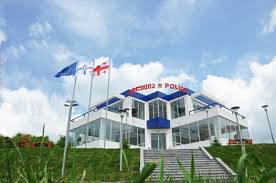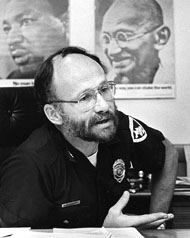 Police reform in the Republic of Georgia seems to go against everything I know about reforming police (with the exception of the wholesale replacing of police departments in the U.S. by newly-elected mayors in the 19th century).
Police reform in the Republic of Georgia seems to go against everything I know about reforming police (with the exception of the wholesale replacing of police departments in the U.S. by newly-elected mayors in the 19th century).
In short, this is the Georgia story: a newly-elected president dismisses the entire national police force and puts new officers on the street in a matter of weeks.
He also built 80 some glass-fronted police stations to demonstrate openness and transparency within the new police (see the police station above).
Prof. Matthew Devlin of Princeton University reported on this in 2009, “Seizing the Reform Movement: Rebuilding Georgia’s Police, 2004-2006.” In it, he describes the process Georgia used:
“In 2003, the bloodless Rose Revolution ushered in an era of unprecedented reform in the Republic of Georgia. Widespread dissatisfaction with the undemocratic and corrupt post-Soviet regime culminated in the 2004 election of Mikheil Saakashvili as president. Riding a wave of popular support and eager to act before the political winds shifted, Saakashvili immediately targeted the corrupt police service, seen by many Georgians as the epitome of state dysfunction. By the end of 2006, his administration had abolished a KGB-style security ministry and its related police unit, dismissed every member of the country’s uniformed police and created a new police force from scratch (my emphasis). By 2009, it was clear that the reformers’ strategy—capitalize on public support, think boldly, act quickly and fix mistakes as they arise (again, my emphasis)―had produced significant progress.
“[Saakashvili] launched an ambitious plan to restructure and re-staff the country’s corrupt and widely reviled police service. The challenge was daunting…
“Saakashvili had the political capital necessary to tackle the problem… Police reform was his administration’s signature initiative, the opening front in what his campaign had promised would be a government-wide anti-corruption crusade… the Saakashvili government succeeded in sharply improving the reputation and performance of Georgia’s police by the end of 2006.
“In 2008, voters firmly endorsed the reforms… though significant challenges remained in 2009, Georgia’s experience of police reform reveals that even the most problematic institutions can be overhauled…
“When this new generation of political outsiders singled out the police for reform, they were taking on the most hardened, xenophobic and byzantine of Georgia’s institutions, its dysfunction deeply rooted in the country’s tumultuous history…
“Police corruption was driven by wages that were below subsistence levels. As one long-serving policeman put it: ‘There were months at a time when the salary was frozen. So the government was, in a way, facilitating police to become corrupt.’ Unable to support their families, officers joined the host of other state functionaries who exploited their authority and discretion for personal gain….
“Georgia’s experience with overhauling its police operations offers lessons for reformers attempting similar changes in other countries. One cautionary lesson has to do with the question of sustainability… Still, such concerns do not obscure the fact that Georgia, against great odds, achieved gains that are worthy of sustaining. By seizing the reform moment, the nascent government sought to maximize its most powerful resource—popular support.
“For the first time in recent memory, the speed of the government’s response matched the urgency of the citizens’ concerns. Thus began a cycle within which the effective and speedy expenditure of political capital built popular support…
“The scope, audacity, and speed of reform matched the fervor of the general population’s disdain for the status quo. From the outset, an outraged public was never asked to subscribe to a detailed reform strategy spread across medium and long-term performance indicators. Actions were immediate and decisive… reformers cannot be content to set their timeframe along ‘the two-year cycle of international needs assessments, strategy papers, and action plans.’
“In the final analysis, Georgia’s experience reveals the immense change that is possible when reform is coupled with high-level political endorsement and a willingness to incur the occasional misstep so that momentum can be maintained.”
+++++++++++++++++
The question here is whether or not the situation of having strong public support for reform, bold thinking, quick action, and the commitment to fix mistakes as they arise might be a new way to instituting bold governmental change. Would this apply to the current Seattle situation? Other departments under federal consent decrees? Something to consider…
[For a copy of the entire report CLICK HERE.]
1. Georgia Tames Its Notorious Police, July, 2012
3. “Success of Georgia’s Police Reform is a Function of Sovereignity, blog, April, 2010 and Video



14 Comments